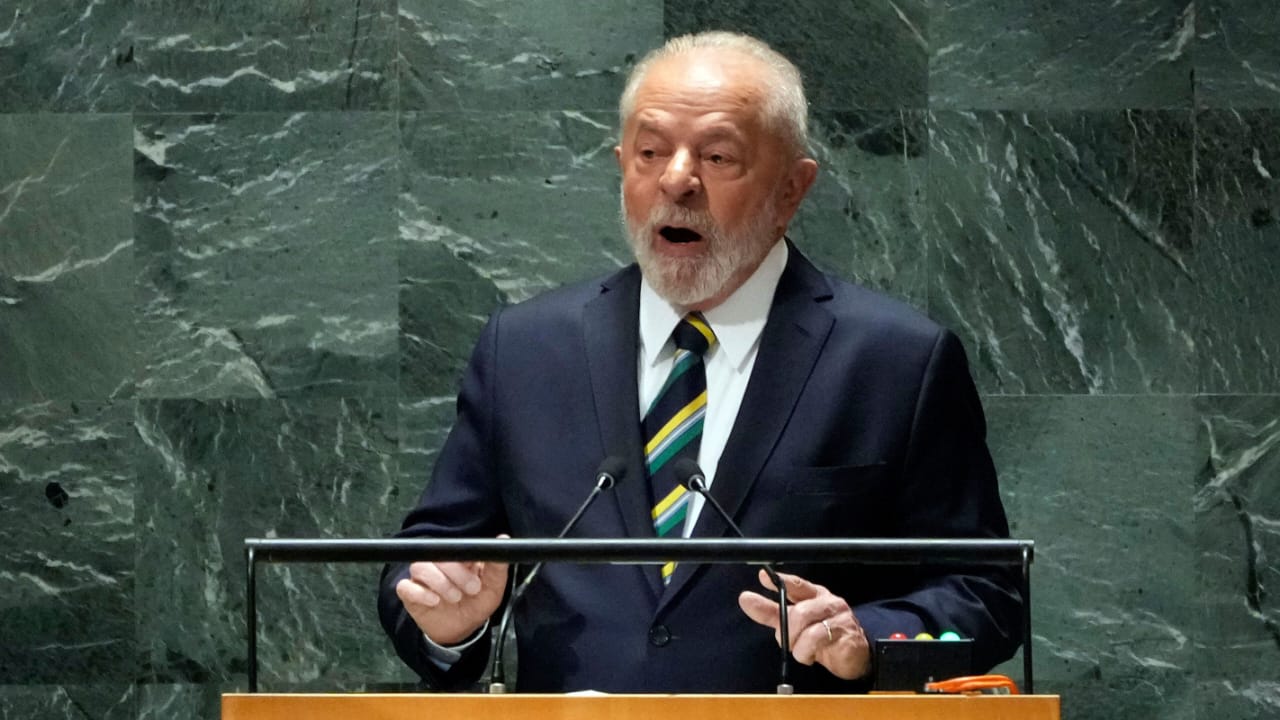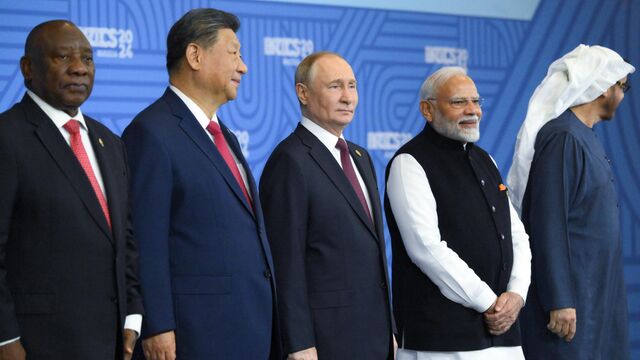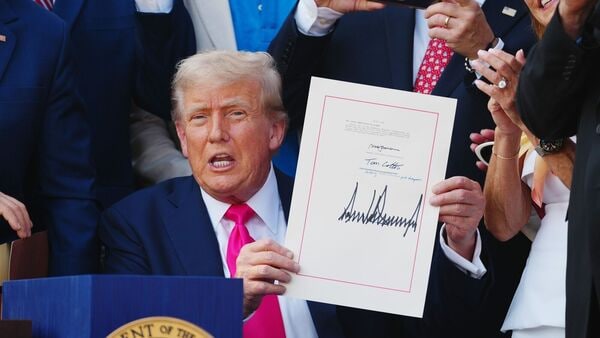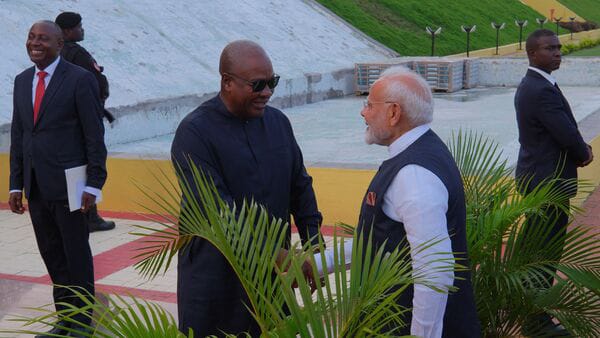
Prime Minister Narendra Modi’s recent visit to Ghana has made headlines not only across India but also internationally. This landmark visit marked a significant milestone in India-Africa relations, particularly with Prime Minister Modi being conferred with Ghana’s highest state honour – “The Officer of the Order of the Star of Ghana”. This was not just a formality; it symbolised deepening bilateral ties, mutual respect and a shared vision for future cooperation. Four key Memoranda of Understanding (MoUs) were signed during Modi’s visit, covering defence, minerals, technology and education.
Furthermore, Ghana’s announcement of the integration of the Unified Payments Interface (UPI) with its financial system signals its desire to expand its digital footprint beyond India’s borders. Let’s take a closer look at the significance of this visit of India and Ghana for the future of the relationship.
All the points in this post
The Significance of the Honor: “Officer of the Order of the Star of Ghana”
Prime Minister Narendra Modi has joined an elite list of world leaders recognised for their contributions to international diplomacy, peace and development after being conferred the title of “Officer of the Order of the Star of Ghana”. Established in 1960, the Order of the Star of Ghana is one of the country’s most prestigious honours. It is conferred on individuals who have rendered exceptional service to Ghana or to humanity at large. Past recipients include former UN Secretary-General Kofi Annan, former South African President Nelson Mandela and several heads of state from around the world.
By conferring this honour on Prime Minister Modi, Ghana has recognised his leadership in promoting world peace, sustainable development and South-South cooperation. His policies such as Swachh Bharat, Make in India and Ayushman Bharat have inspired many developing countries, including Africa. The recognition further cements Modi’s image as a statesman who is respected not only in India but across the continent.
PM Modi Becomes First Foreign Prime Minister to Receive 24 Global Awards
Prime Minister Modi has now received 24 international awards, making him the first Prime Minister of any country to receive such recognition. From the Zayed Medal of the United Arab Emirates to the Grand Cross of the State of Palestine, Modi’s collection of global accolades spans continents and ideologies. These awards are not just symbolic, they reflect the soft power diplomacy that India has adopted under his leadership.
Political observers believe that Modi’s ability to maintain strong bilateral relations while balancing complex geopolitical equations has earned him global acclaim. And the fact that he continues to receive these honours amidst global polarization speaks volumes about his diplomatic acumen.
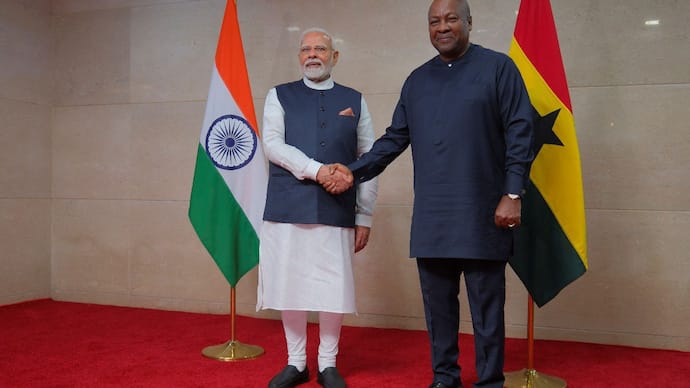
UPI Expansion into Africa: A Strategic Move
One of the biggest announcements during Modi’s visit to Ghana was the launch of India’s Unified Payments Interface (UPI) in Ghana. For those unfamiliar, UPI is India’s revolutionary digital payments system that allows instant money transfers between bank accounts using mobile phones. It marks a watershed moment in India’s digital diplomacy. Ghana is one of the fastest growing economies in Africa, with a young, tech-savvy population. For India, this move is not just about exporting technology, it is about building a long-term economic partnership.
Increasing trade and investment between the two countries, reducing transaction costs for individuals and businesses, promoting greater financial inclusion in Ghana and showcasing India’s digital prowess on the world stage. The initiative is in line with Modi’s vision of India becoming a global leader in technology and innovation, not just a consumer of Western gadgets.
Four MoUs Signed During the Visit: Key Highlights
During the high-level talks between Prime Minister Modi and Ghanaian President Nana Akufo-Addo, four important MoUs were signed, each with a Memorandum of Understanding (MoU). Defence India and Ghana have agreed to enhance defence cooperation, with the aim of capacity building, joint military exercises and sharing expertise in maritime security. Minerals, Ghana is rich in natural resources such as gold, bauxite and manganese. India, with its strong industrial demand for raw materials, sees immense potential in harnessing these resources. It also opens the door for Indian companies to invest in Ghana’s mining sector.
Under this MoU, cooperation in emerging technologies such as artificial intelligence, blockchain and cyber security is expected to increase. To build human capital, India and Ghana will work together in the areas of vocational training, scholarships and academic exchanges. This includes training Ghanaian youth in technical fields and providing higher education opportunities in Indian institutions. These agreements lay the foundation for a comprehensive and multi-dimensional partnership between India and Ghana.
Strengthening Defense Ties Between India and Ghana
India’s engagement with African countries has traditionally been based on defence cooperation. Through platforms such as the India-Africa Forum summit and bilateral military engagements, India has steadily built trust and credibility. In addition, Ghana’s strategic location on the Atlantic coast makes it an important partner in maritime security. With the growing Chinese and Russian presence in the region, India’s growing defence campaign acts as a counterweight and strengthens regional stability. Modi’s emphasis on defence exports and co-development of military equipment could soon find suitors in Ghana, opening up a new frontier in India-Africa defence relations.
Minerals Exploration: Unlocking Economic Opportunities
Ghana is one of the world’s top gold producers. It is also a major exporter of cocoa, oil and timber. However, most of its mineral resources remain untapped due to outdated infrastructure and limited technological know-how. India is well-positioned to assist Ghana in this regard, given its extensive knowledge of sustainable extraction techniques and mineral processing. Under the MoU, Indian companies are expected to bring in advanced geological mapping technology, environmental protection and investment in downstream industries. India’s need for critical minerals to fuel the green energy sector makes this partnership mutually beneficial.
Diplomatic and Strategic Implications of Modi’s Visit
Prime Minister Modi’s visit to Ghana was not just about signing agreements, it was also part of a larger plan to strengthen India’s position in Africa. Africa is home to a population of about 1.4 billion, a growing middle class and abundant natural resources. India is establishing itself as a trusted and fair partner in the face of the growing presence of traditional powers like China and the United States. India’s efforts to reform global governance structures have found a willing ally in Ghana, which has consistently supported African voices in global forums.
Public Reception and Media Coverage in Ghana
Prime Minister Modi’s visit was not only a diplomatic success but also a major public relations success. Thousands of people gathered in Accra to welcome the Indian Prime Minister, many waving the tricolor and chanting slogans of unity and friendship. Social media was abuzz with videos and pictures of Modi interacting with Ghanaian children, visiting historical sites like the Kwame Nkrumah Mausoleum, and participating in cultural performances.
Local newspapers praised Modi’s leadership and highlighted the potential benefits of closer ties with India. International media outlets like the BBC, Al Jazeera, and Reuters covered the visit extensively, highlighting its geopolitical significance. Modi’s charm offensive worked – he didn’t just meet politicians, he connected with the people, leaving a lasting impression.
A New Chapter in India-Ghana Relations
Prime Minister Narendra Modi’s visit to Ghana has ushered in a new chapter in India-Africa relations. From receiving the highest national honor to expanding UPI, signing important MoUs, and strengthening defence and mineral partnerships, every aspect of the trip was strategically planned and executed. The visit reaffirmed India’s commitment to Africa, not as a donor or a distant power, but as a close friend and equal partner.
As India continues to play a significant role on the world stage, its growing ties with African countries like Ghana will remain a cornerstone of its foreign policy. Today’s news is the last to be seen here. Tomorrow, with another update, stay well and stay well.


